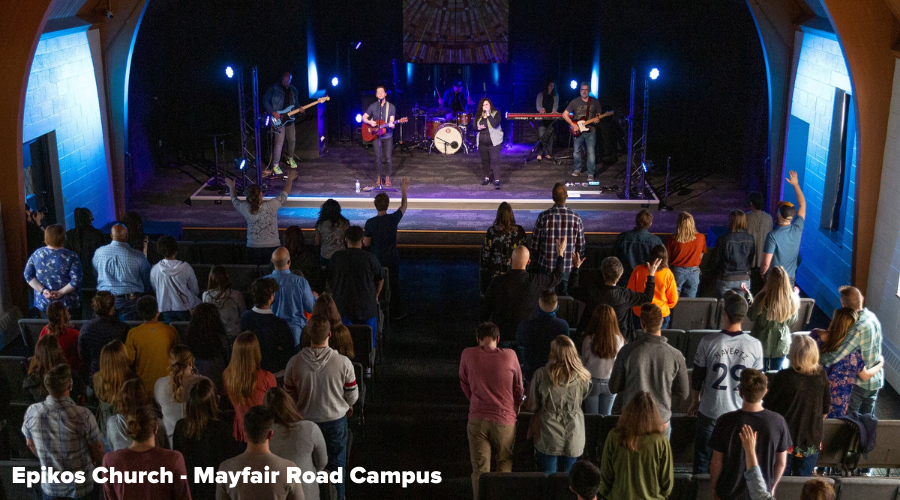
Nathan Gaffney, the facilities coordinator for Epikos Church, had a once-in-a-lifetime challenge to prepare for a fourth campus: how do you make hand sanitizer for hundreds of people meeting around Milwaukee?
So far, Gaffney has made four gallons, according to Frank Gil, the campus pastor for the new Mayfair Road location of Epikos.
“Every person launching a campus, or a church, has to have a level of ingenuity,” said Epikos Mayfair Road campus pastor Frank Gil. “Multiply that by a hundred, and that’s what we were dealing with in COVID.”
Therefore, gallons of homemade hand sanitizer is just one of many creative solutions and unexpected tasks for the new campus, which launched March 21 with masks. Gaffney formed a recipe from essential oils and the same alcohol in mass-produced hand sanitizers available in stores.
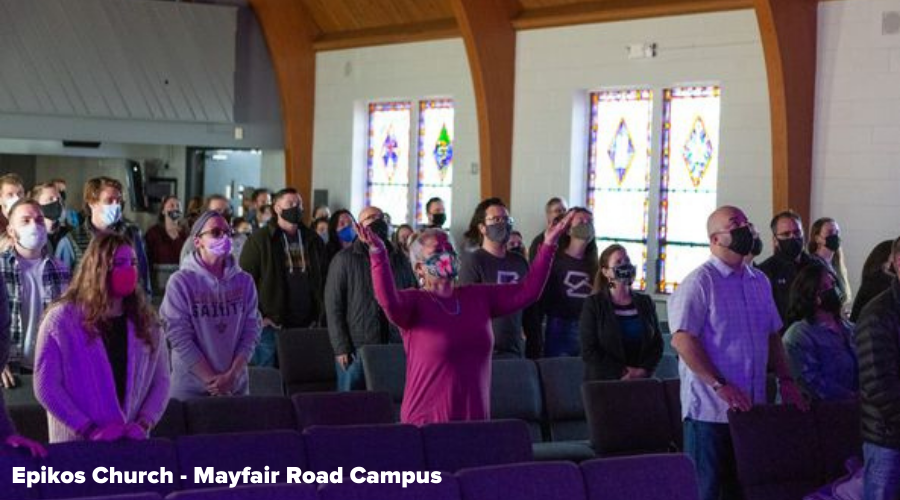
Building momentum wherever possible
Supply chain snags delayed the construction of the brand-new building for the Mayfair Road campus. For the leadership team, the global pandemic forced the launch team to build momentum for obeying God’s will through video calls and online team gatherings.
Still, Epikos held their first worship services Sunday in the Mayfair Road community at the church’s newest campus.
Nathan Law, who’s planting a church to hold public services this year near Houston, is working to build momentum through online gatherings as well.
“Right before COVID, we were a couple of months out from a fall launch,” he said. “From there, we got shut down everywhere we were meeting, and we went virtual.”
While in-person gatherings for worship weren’t an option, Law said his Renovation City Church team focused on discipleship to invest in the core team and outreach events to minister to the community.
Pressing on in service to the community
Renovation City Church, which meets in Pearland, south of Houston, has partnered with a community feeding program.
“We really want to make a difference in the community,” Law added. “We’ve always wanted to be a grassroots church plant, but we had to go even more grassroots.”
That meant learning how to have a quality online presence to do ministry as best they can and lead toward a church plant by starting more discipleship groups.
“One thing that might have changed, at least for us, it’s made us really lock into our vision more,” he said of COVID-19 and being online. “It might take a little longer to get where we want to go on the outside, but because of that, we’re going to lock in even more on vision.”
Related: Church planting: How it looks different in 2021
Another reason Law has seen for locking into the vision is recognizing just how committed many of his core families have become to the vision.
“A family who joins the church plant won’t have a lot of bells and whistles. Why would they not go to that church that offers more ministry for the kids?” he asked. “It’s because they buy into the vision. They think it’s a really cool vision.”
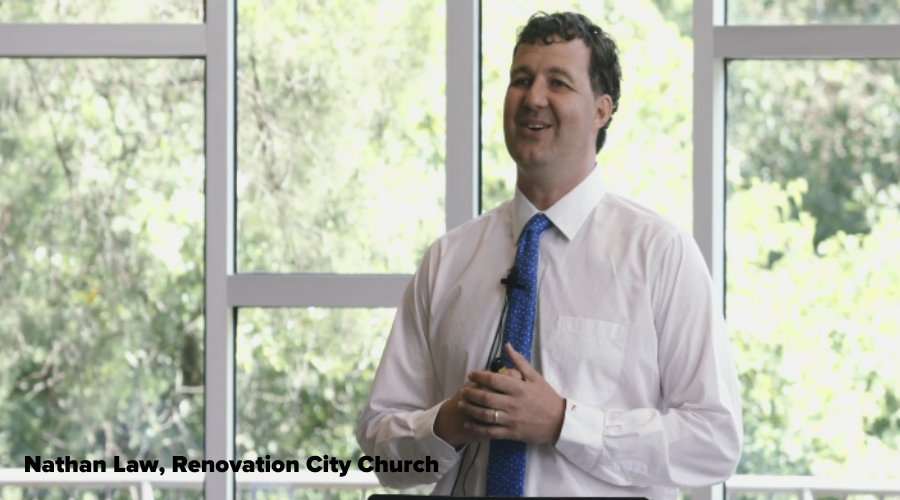
When is a church ready to launch?
One of the questions on Law’s mind is also on other church planters’ minds: When is a church ready to have public services?
Law has heard from others and generally agrees that a church should have a lot of momentum before it ever launches. “We want to have 125 when we publicly launch but now, is our church looking for more like 50 to 75 people?”
He and his leadership team are reflective on these kinds of questions. But he knows part of the answer is making a quality effort no matter who shows up in this crazy time.
“There is that pressure that if you can’t provide for yourself through this, you feel like you have to compromise or live outside the vision in some ways,” he said of what church planters can wrestle with. “Maybe it will take a year or longer before you get to that sustainable number, but it’s worth it if you stay healthy.”
With Renovation City Church they are working to raise outside support. They want to be able to tell people from the beginning they are a missional church.
“We’re reaching as many people as we can and making disciples,” he added.
Related: 4 reasons church planting is the best investment
Can you plant a church in the Bible Belt?
When Charley Dever and his wife Nichole visited Knoxville, Tennessee, they were in the middle of what you might call a church planting road trip. They were visiting cities and pondering the dynamics of a church plant in each of those places.
In Knoxville, the third city on their missiological odyssey, they hung out around 4th and Gill. The area on the edge of downtown wasn’t always thriving as transition and growth come to the community.
That’s precisely where the two wanted to be. But, the Devers made a surprising discovery among the people steeped in the Bible Belt’s religious life.
As they told people why they were in Knoxville to start a church, “They were friendly, but we experienced what we could almost call kind hostility,” he said. “People had no issue telling us what their problems were with the church.”
The message was clear: Please don’t start more churches.
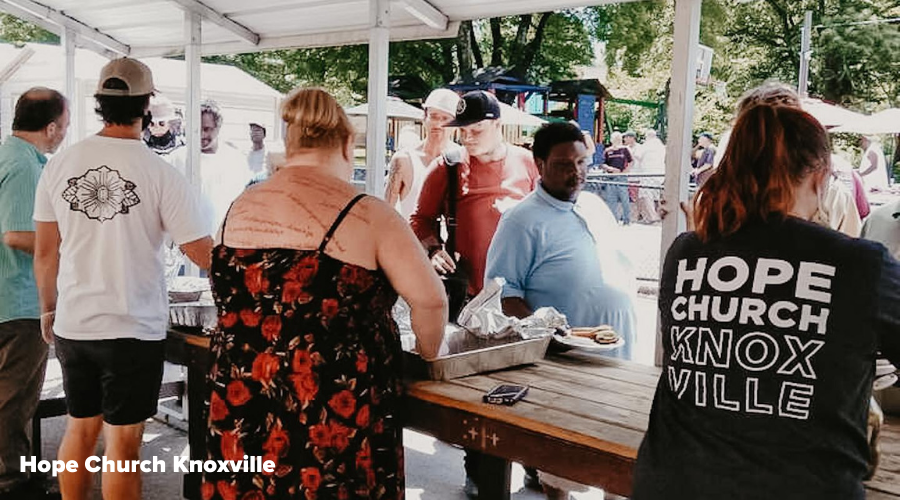
Eventually, the Devers came across a study by First Baptist of Concord, a large church in an affluent community with a long history of ministry. That church conducted a study five years ago. Less than 20 percent of people in Knox County and Knoxville are involved in church regularly. The number of people in the 4th and Gill downtown area who go to church is even less.
The Devers’ expectations were going to have to change.
“That challenge really intrigued me,” he said. “I thought we were going to do weekly services and have a hip space and attract young people.”
Instead, they meet twice a month at an Anglican church for worship, story sharing and fellowship. The rest of the month is what has become Hope Communities.
These are small groups of people organized around a mission, such as finding a need and serving that need in the community or neighborhood. Some of these communities are organized relationships with unchurched or dechurched people, meaning those whose church experiences turned them away from Sunday morning experiences.
Related: Converge to church planters: “You are not alone.”
“It felt like no matter what we did on Sunday morning, somebody could have all those characteristics (common to dechurched people) and not want to come,” he said. “We knew that whatever we did, we wanted to create something for the people who wouldn’t come through the doors on Sunday morning.”
Devers has aligned himself with the Forge Network, an organization that began in Australia to assist churches with creative ideas for faithful, contextual ministry. Forge Network is now in the United States as well, influencing existing churches and new churches.
“I think every generation needs to take church as they know it and put it on the table,” he said. “Ask what is essential to church and what is contextual. Every generation needs to critique the mode of church they’ve been given and take it back to Scripture and work it out in their context.”
Devers originally planned to leave his native Chicago for a Western city such as Portland or Denver. This desire continued up until the final months of his time in seminary at Trinity.
“I was really resistant to coming to a place that was considered the Bible Belt,” he said. But he kept in touch with Danny Parmalee, Converge MidAmerica/Southeast/Caribbean vice president of Church Planting. Over time, “God just kept closing doors on all the places” Devers had considered.
Now, they have three hope communities organized in some sense by geography and demographics, COVID-19 considerations and the group’s mission.
I think every generation needs to take church as they know it and put it on the table. Ask what is essential to church and what is contextual. Every generation needs to critique the mode of church they’ve been given and take it back to Scripture and work it out in their context.
Each of those groups must have three qualities: an intentional core – leadership in a sense – a communal space to gather for churched and unchurched or dechurched and a party space where there’s no agenda beyond building relationships.
But above all, the team has been redefining what it calls success. A vital part of that is being with people on their journey, including some form or level of faith and openness to faith.
Another meaningful aspect of their time together that represents success is being together with people. For example, the hope communities reach out to women in prostitution in one Knoxville neighborhood. Anyone is welcome to join them as they hand out snacks or hygiene products. Sometimes, the hope communities gather in a party space, as they call it, enjoying a bonfire together.
“The hope is that when you start, you might have a very large party space,” he explained. “But throughout the life of the community, the communal space grows and over time, the intentional space grows.”
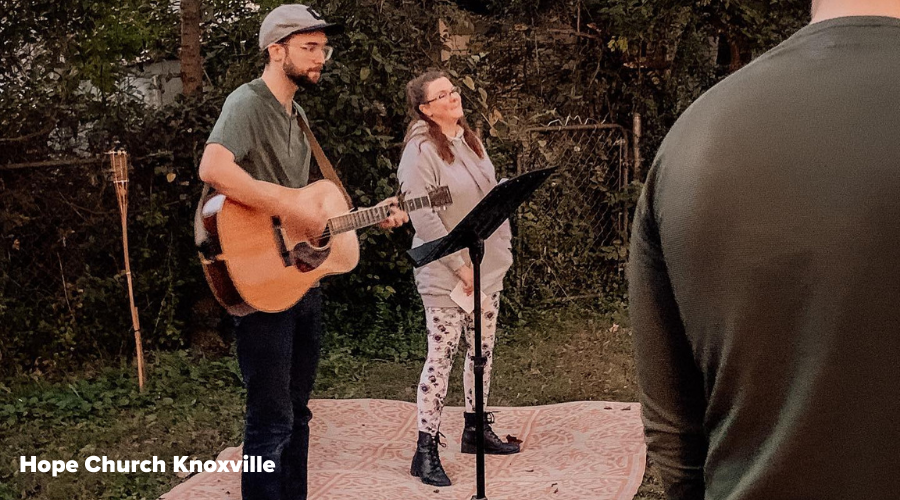
COVID-19 restrictions haven’t impacted Hope’s gatherings much at all. The small groups merely adapted according to their needs or comfort level. One group went online, one group met outside and one group was able to meet inside.
Devers was drawn to this concept of church before COVID-19 was even discovered. He moved to Knoxville 18 months ago from Chicago with his wife and three other families.
Before that, Devers saw in his parents’ faith journey how following Jesus doesn’t always follow the script or path of much of evangelical Christianity in America.
One night, his parents were performing in a bar. Someone invited them to play the music for worship at a Presbyterian church when they weren’t even believers. By the time Devers was a boy, his parents were new Christians, on fire with passion for worship, love and service to the triune God.
Now he takes that approach in his ministry in Knoxville. For example, he lets people get involved in ministry and trusts God to work on their hearts.
“Everyone in our community is very, very bold about our faith,” he said. “But we try to allow people, rather than us telling them something, to participate in that conversation.”
He has had several close friends who professed faith in high school, perhaps at a Bible camp or a worship night or a similar event. But now, those friends ― too many of them, he said ― are not walking with Jesus. So, he’s reflective about methods for evangelism and how people come into a relationship with Jesus.
“There are so many people who are open to Jesus and want to belong to a community but wouldn’t go to church,” he said. “How do we create space for the 80 percent of people in Knoxville who, for whatever reason, with 700 churches providing Sunday services, find it doesn’t work for them?”
[advertisements title=”Become a church planter” site=”National”]
You can make an eternal impact by supporting Converge church plants through the Launch Offering, which provides funding to Converge churches on their launch date.